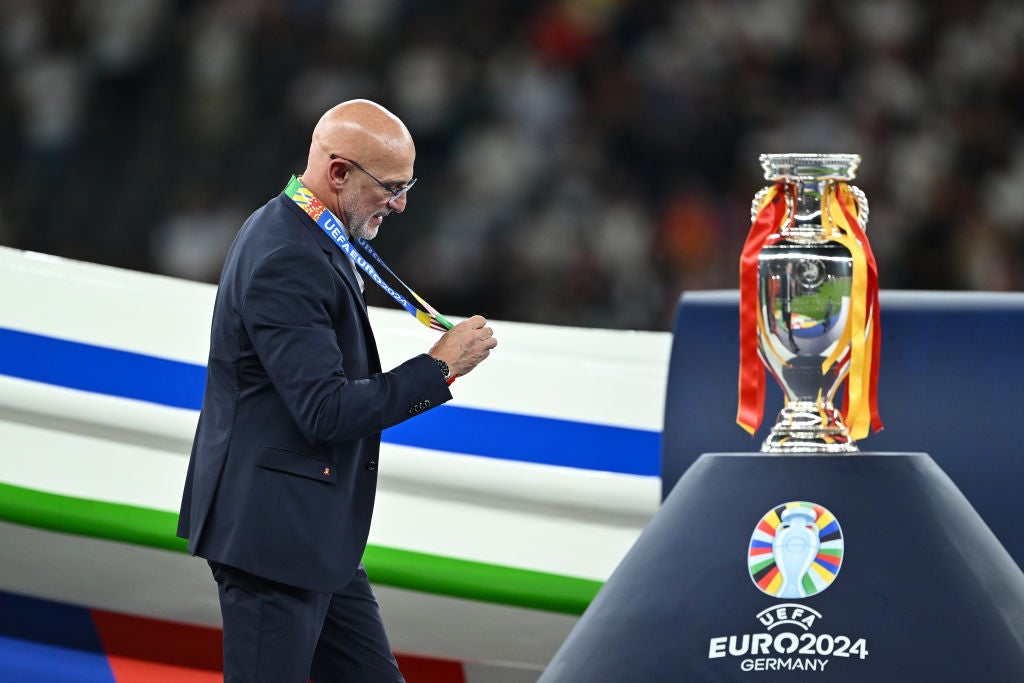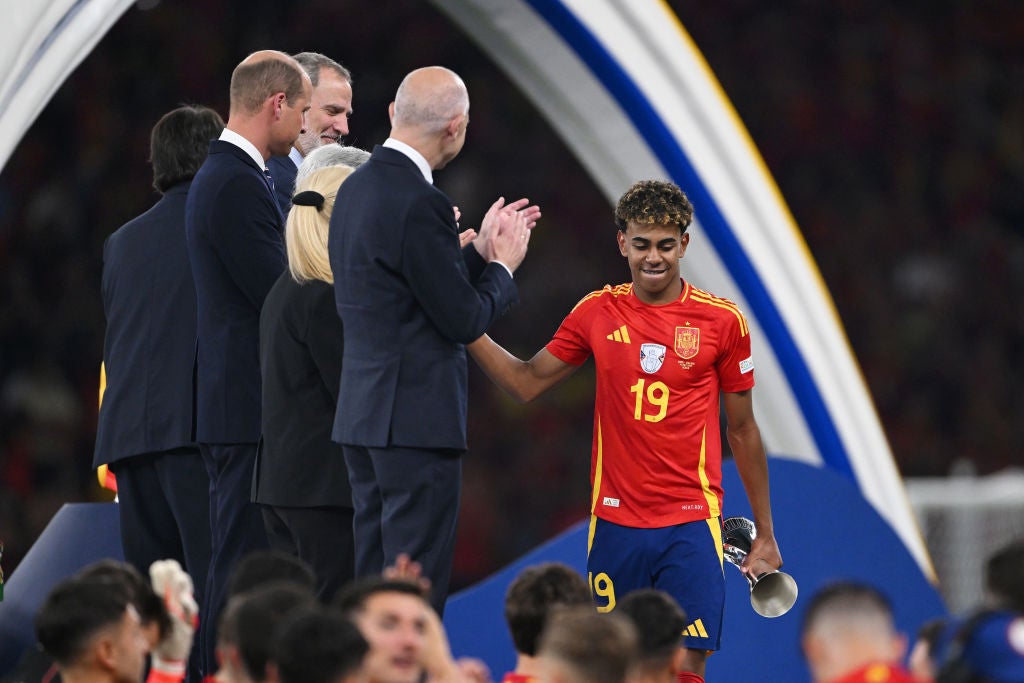Spain’s new golden generation can dominate football again – Euro 2024 is only the beginning
It’s not just England who might have been shown up by the latest set of Spanish superstars but the likes of France too

Your support helps us to tell the story
From reproductive rights to climate change to Big Tech, The Independent is on the ground when the story is developing. Whether it's investigating the financials of Elon Musk's pro-Trump PAC or producing our latest documentary, 'The A Word', which shines a light on the American women fighting for reproductive rights, we know how important it is to parse out the facts from the messaging.
At such a critical moment in US history, we need reporters on the ground. Your donation allows us to keep sending journalists to speak to both sides of the story.
The Independent is trusted by Americans across the entire political spectrum. And unlike many other quality news outlets, we choose not to lock Americans out of our reporting and analysis with paywalls. We believe quality journalism should be available to everyone, paid for by those who can afford it.
Your support makes all the difference.An unprecedented era of dominance, the greatest men’s international side of the modern age. Back-to-back-to-back winners of major tournaments. The Spain side of 2008-2012 gave football a new way of looking at the uppermost elite reaches of the game, and gave all sides to come after them a lot to live up to.
The fall that followed, though, was swift, dramatic and prolonged: Spain won just one match at each of their next three World Cups following victory in 2010 and haven’t been past the round of 16 since then.
After retaining the European Championship in 2012, they won only two games in 2016 and the same number in 2021. A long time in the relative wilderness, even if the latter tournament saw them sneak through to the last four.
And yet at Euro 2024, they didn’t just find the right balance of mentality and technique, they found their ideal style. They didn’t just win the competition, they won all seven matches – only the second nation to achieve such a feat en route to major tournament glory, after Brazil at the 2002 World Cup.
Spain have found a new version of themselves, one which has proven better than all their rivals in every way that matters – and the best part of it is that they are only just beginning. The players, as well as the platform, are there for much longer, much more sustained success.
In some respects, it’s difficult not to feel some sort of sympathy for Gareth Southgate and perhaps England as a whole – players and fans alike.
After all, they’ve painstakingly built a culture, fostered an approach, enabled player growth and had a detailed methodology to try to bend everything within their control to their will, crept closer and closer to the biggest prizes... and lost two finals. A brand new Spain side comes along, meanwhile, and wipes the floor clean at their first attempt.
But that’s part of the reason to believe La Roja are here to stay: they’ve done it walking a path they would have continued down regardless, even if they’d been beaten in Berlin beforehand.
“We did it in a way which is difficult to better. It’s a group of footballers that never tire of improving, competing, wanting to win. I’ve been so proud of them since the first day,” head coach Luis de la Fuente said, immediately following his team’s triumph.

“We’ve been true to an idea and we have a lot of different ways we can play depending on the stage of the game. We have a generation of footballers who are magnificent and they are going to continue to grow. [But] it’s not comparable with the generations of the past because they were the best and they were the best at things in their era.”
De la Fuente is right in that regard – this certainly wasn’t death by possession, passing teams into submission. Spain dominated the final by pressing and creating overloads to keep territorial advantage but had several counter-attacking chances to kill the game, too.
It’s a new way for a new team – although, that’s new to the senior international stage, not new to him. Like his Euro 2024 final opposite number Southgate, De la Fuente took the role from within. The former U19 and U21 coach knows this group better than anyone, a surefire part of the reason the Royal Spanish Football Federation hired him in the first place.
“We’ve won everything together, Mikel [Oyarzabal] never misses,” he explained. “He can play everywhere, he creates and scores but he always does something. It’s what these players can do. Martin Zubimendi had a sensational second half replacing Rodri who is the best in the world – give him the Ballon d’Or right now, please.
“The advantage is that I know the footballers. I know what they can do, what they can give and that they’ll never let me down.”
There are others he knows and has counted on too, who didn’t even feature in Berlin: Pedri, the starting No 10 who was injured against Germany; Gavi, his ludicrously talented clubmate who wasn’t even in the squad as he recovers from a long-term absence of his own.

At the same Catalan club, 17-year-old Pau Cubarsi and 20-year-old Alejandro Balde present new defensive options, as does Pedro Porro – a potential immediate switch to replace and rejuvenate the right-back options if 38-year-old Jesus Navas has played his final part. There aren’t too many other squad members who are due an end: Nacho and Joselu perhaps, both 34 and both off to Asia, but in Yeremy Pino, Oihan Sancet and more there are options aplenty for future squads who have already been partly or fully integrated.
And yet it’s not remotely all about the players who haven’t been in Germany. For starters, it doesn’t take an enormous leap to suggest that Lamine Yamal, who was still 16 until the day before the final, might improve over the coming couple of years.
Not every Barcelona breakout youngster does, but winning young player of the tournament is a good sign of the trajectory he’s on.

Fellow winger Nico Williams scored the first and was man of the match in the final; asked if Spain can go and win the World Cup in 2026, he understandably wanted more than three minutes to enjoy this success first.
“First we’re going to enjoy the one we’ve just won!” he said. “It’s two years away yet but step by step we want to keep getting better.”
Football development isn’t linear, but it wouldn’t be a surprise to see Spain improve further because of the clarity they have over style, over team-building, over how to attack and beat teams.
Therein lies a key difference with La Roja, not just over England but other nations too like France, who have been criticised for not making anywhere near the most of the talents they’ve got: Spain came to win, not to avoid defeat. There’s a big difference, and their valour won out in the end.
They might not go on to win three in a row but for the next few tournaments at least they will be challengers and, after this month in Germany, already possess the knowhow to get the job done. Spain’s newest generation already looks like another golden one.
Join our commenting forum
Join thought-provoking conversations, follow other Independent readers and see their replies
Comments